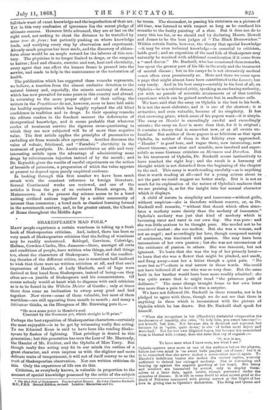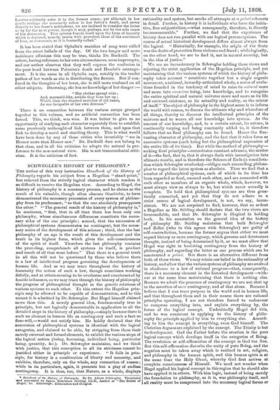SHAKESPEARE'S MAD FOLK.•
Mir people experience a certain weariness in taking up a fresh book of Shakespearian criticism. And, indeed, there has been so very much of Shakespearian criticism that the feeling of weariness may be readily understood. Schlegel, Gervinus, Coleridge, Hallam, Cowden-Clarke, Mrs. Jameson—these, amongst all sorts and conditions of people, have written wise things, and dull things too, about the characters of Shakespeare. Tired of the conflict- ing theories of the different critics, one is sometimes half inclined to wish that there were no written criticism at all, and that one's impressions of Hamlet, of Lady Macbeth, and of Iago were derived at first hand from Shakespeare, instead of being—as they often are—a jumble of Shakespeare and his commentators. Of course nobody would at heart wish to dispense with such criticism as is to be found in the Wilhelm Meister of Goethe ; only at times there does come an inclination to sweep away good and bad together. New views—some of them valuable, but most of them worthless—are still appearing from month to month ; and many a littirateur thinks, as the Blougram of Mr. Browning puts it,— "He sees some point in Hamlet's soul
Unseized by the Germans yet, which straight he'll print."
Perhaps the best exposition of Shakespearian characters—certainly the most enjoyable—is to be got by witnessing really fine acting. To see Edmund Kean is said to have been like reading Shake- speare by flashes of lightning. That privilege is denied to this generation; but this generation has seen the Lear of Mr. Macready, the Hamlet of Mr. Fechter, and the Ophelia of Miss Terry. But though really fine acting may fix in our minds the outline of a great character, and even impress us with the slighter and more delicate traits of temperament, it will not of itself convey to us the truth of Shakespearian observation. Nor can written criticism do this. Only the experience of life can do this.
Criticism, as everybody knows, is valuable in proportion to the amount of special knowledge possessed by the critic of the subject
* The Mad Fdk of Shakespeare. Psychological Essays. By John Charles Buchan], M.D., F.E.S. Second Edition, revised. London: Macmillan and Co. he treats. The shoemaker, in passing his strictures on a picture of
old time, was listened to with respect so long as he confined his remarks to the faulty painting of a shoe. But it does not do to carry this too far, or we should end by declaring Messrs. Howell and James to be the best judges of "The Black Brunawicker." Within certain limits, however, the theory that special knowledge — it may be even technical knowledge—is essential to criticism, holds good ; and an exposition of the mad folk of Shakespeare may naturally be received with additional consideration if it come from a "mad doctor." Dr. Buckuill, who has occasioned these remarks, has spent the greater part of his life in the study and the treatment of mental disease ; but in his essays he is not obtrusively medical — not often even prominently so. Here and there we come upon a page that might almost have been contributed to the Lancet; but very rarely. And in his best essays—notably in his best of all, on Ophelia—he is a cultivated critic, speaking as one having authority, yet with no parade of scientific attainments or of that terrible experience which can be gained nowhere but in madhouse cells.
We have said that the essay on Ophelia is the best in his book. It is not the most elaborate, and it is one of the shortest ; it is attractive, and even valuable, because of its simplicity. It has that crowning grace, which some of his papers want—it is simple. The essay on Hamlet is exceedingly careful and exceedingly minute ; the essay on Lear is more than that, for it is original ; it contains a theory that is somewhat new, or at all events un- familiar. But neither of these papers is so felicitous as that upon Ophelia, in neither of them is that felicity even approached. " Hamlet" is good here, and vague there, now interesting, now almost tiresome, now clear and sensible, now involved and super- subtle as some German criticism on Hermann and Dorothea. But in his treatment of Ophelia, Dr. Bucknill seems instinctively to have touched the right key ; and the result is a harmony of thought which is not disturbed from the beginning of the chapter to the end. This essay is worth reading carefully—as is anything that is worth reading at all—and for a young actress about to act the part we could suggest no better study. But it is not so much for its explanation of the nature of Ophelia's madness that we are praising it, as for the insight into her normal character which it displays.
A child of nature in simplicity and innocence—without guile, without suspicion—she is therefore without reserve, or, as Dr. Bucknill well remarks, "without that deceit which often simu- lates a modesty more dainty than the modesty of innocence." Ophelia's modesty was just that kind of modesty which is becoming rarer and rarer in our own day. Sho was pure : and she was little anxious to be thought pure. She needed not to be considered modest : she was modest. But she was a woman, and not an angel ; and accordingly her love, though composed mainly of sentiment, was tinctured with passion. She may have been unconscious of her own passion ; but she was not unconscious of the existence of passion in others. She was innocent, but not ignorant. To learn that she was the toy of her princely lover— to learn that she was a flower that might be plucked, and smelt, and flung away—cost her a bitter though a quiet pain. "No more but so ?"—there is real sorrow in those words. She could not have believed ill of one who was so very dear. But the same fault in her brother would have been more readily admitted : she was quite aware that he might tread "the primrose path of dalliance." The same charge brought borne to her own lover was more than a pain to her—it was a surprise.
We have not followed Dr. Bucknill in these remarks, nor is he pledged to agree with them, though we do not see that there is anything in them which is inconsistent with the picture of Ophelia which he has drawn. But Dr. Bucknill shall speak for himself.
" When she recognizes in his (Hamlet's) disdainful vituperation the incoherence of insanity, she cries, '0, help him, you sweet heavens
I'— not herself, but him. Not because she is deceived and rejected, but because he is 'quite, quite down,' is she of ladies most deject and wretched.' Not for her own blighted hopes, but because his unmatched form is blasted with ecstasy, does she raise that cry of anguish :—
' 0, woe is me,
To have seen what I have seen, see what I see !'
Ophelia appears once more as one of the audience before the players, before her own mind is 'as sweet bells jangled out of tune ;' but it is to be remarked that she never makes a consecutive speech again. Tu Hamlet's indelicate banter she makes the curtest replies, scarcely sufficient to defend her outraged modesty. She is concealing and bearing up against the anguish gnawing at her heart. But fancy and intellect are benumbed by sorrow, only to display them- selves at a later date, again active, though perverted under the stimulus of disease. It is left in some doubt to what extent grief at the death of Polonius concurred with pining sorrow at the blight of her love in giving rise to Ophelia's distraction. The King and queen and Laertes evidently refer it to the former cause; yet although in her' gentle ravings she constantly refers to her father's death, and never directly to her lover's unkindness, we are inclined to consider the latter a3 by far the most potent, though it may, perhaps, not be the sole cause of her distraction. This opinion founds itself upon the form of insanity which is depicted, namely, mania with prevalent ideas of the sentiment of love, or erotomunia, as it is learnedly called."
It has been stated that Ophelia's snatches of song were culled from the street ballads of the day. Of the two longer and more indelicate effusions this may be true, thinks Dr. Bucknill. The others, having reference to her own circumstances, seem impromptu, and our author observes that they well express the confusion in the poor head between Polonius's death and Hamlet's estrange- ment. It is the same in all Ophelia says, notably in the tender pathos of her words as she is distributing the flowers. But if con- fused in the thoughts of her lover, she is still more confused on all other subjects. Drowning, she has no knowledge of her danger :—
" Her clothes spread wide; And, mermaid-like, awhile they bore her up ; Which time she chanted snatches of old tunes, As one incapable of her own distress."
There is no connection between the various essays grouped together in this volume, and no artificial connection has been forced. This, we think, was wise. It was better to give us an opportunity of studying each character separately than to establish some previously unthought-of link between them, and upon that link to develop a novel and startling theory. This is what would have been done by any of those critics who invariably " see in Homer more than Homer saw." Dr. Bucknill does not belong to that class, and in all his criticism he adopts the natural in pre- ference to the non-natural view. his is not transcendental criti- cism. It is the criticism of fact.































 Previous page
Previous page